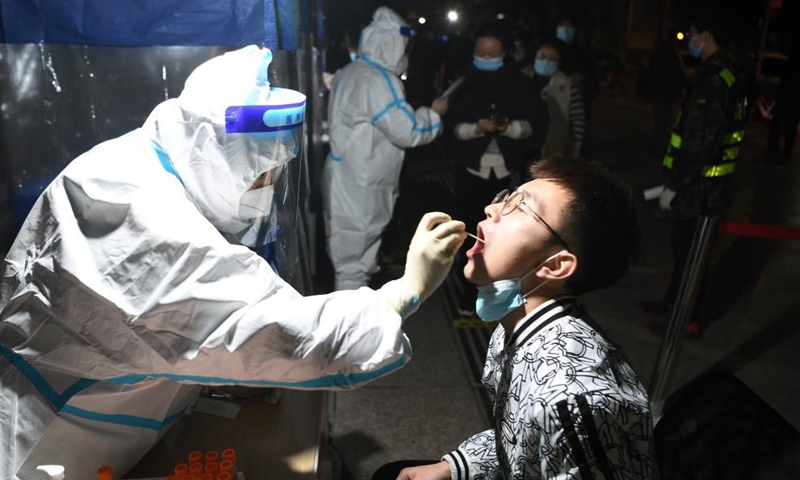
A medical worker collects swab samples at a nucleic acid testing site in Chengguan District of Lanzhou City, northwest China's Gansu Province, Oct. 21, 2021.Photo:Xinhua
Northwest China's Gansu Province has suspended all tourism activities in a circuit-breaker measure after spiking COVID-19 cases, with all tourists in Lanzhou, where most COVID-19 cases in the province were reported, required to stay in wherever place they were and being quarantined.
Industry observers said circuit-breaker mechanism complies with the country's zero-tolerance policy and the impact on Gansu, a popular destination for the country's northwest tourism market, will be limited as local tourism is entering its off season after the National Day holidays.
The suspended national tourism destinations include the world-renowned Mogao Caves, also known as the Thousand Buddha Grottoes or Caves of the Thousand Buddhas in Dunhuang, Crescent Moon Spring, also in Dunhuang, and Zhangye National Geopark and Jiayu Pass, the western end of the Great Wall of the Ming Dynasty (1368-1644) and also a vital passage of the famous Silk Road.
From October 18 to Saturday night, Gansu registered a total of 41 confirmed cases, of which 30 are from Lanzhou, seven from Zhangye, two from Jiayu Pass, one from Tianshui and one from Longnan.
Gene sequencing revealed the cases in Gansu were caused by Delta variant. Infections in Beijing, Inner Mongolia and Shaanxi were also reportedly caused by Delta variant.
The province decided to adopt circuit-breaker measures to further tighten epidemic control. Tourism and health departments in the province jointly announced on Saturday that the province will suspend all tourism activities, close off all scenic spots, amusement and cultural performance venues and cinemas. All kinds of performances, exhibitions and clustered activities were suspended.
This measure is in line with requirements released by the Ministry of Culture and Tourism on Saturday. It requires travel agencies, in a circuit-breaker measure, to suspend cross-provincial tourism activities in regions that contain medium- or high-risk areas.
Yang Dezhi, the deputy mayor of Lanzhou, said at a press conference on Sunday that to reduce the flow of people, Lanzhou has terminated all travel activities of tourists in the city, adopted on-site isolation, observation, and nucleic acid testing.
Adoption of circuit-breaker mechanism in tourism amid the epidemic complies with China's zero-tolerance policy but it is only a temporary measure to ensure virus transmission to be timely cut off and tamed, Li Mingde, an academic adviser at the Tourism Research Center under the Chinese Academy of Social Sciences, told the Global Times.
Tourism industry observer surnamed Wang told the Global Times on Sunday that the circuit-breaker mechanism won't cause a huge impact on local tourism in general because local tourism is entering its off season after the National Day holidays. When the epidemic clears, tourism is unlikely to suffer huge losses as Gansu is extremely popular for China's northeast tourism market.
During the past National Day holidays, the entire province received a total of 17 million tourists, earning revenue of 10.26 billion yuan, an increase of 17 percent and 21.7 percent respectively over the same period in 2020.
Of which, Zhangye National Geopark received 134,000 tourists; Mingsha Mountain and Crescent Moon Spring in Dunhuang received 115,000 tourists; and Jiayu Pass received 98,000 tourists.
Gansu now has five medium-risk regions. After the epidemic resurgence, local market supervision departments in Gansu's Lanzhou and Jiayu Pass have dispatched 12,400 people to examine epidemic control measures implemented in more than 10,000 businesses. More than 1,000 cases that found in improper epidemic control were asked to rectify.




